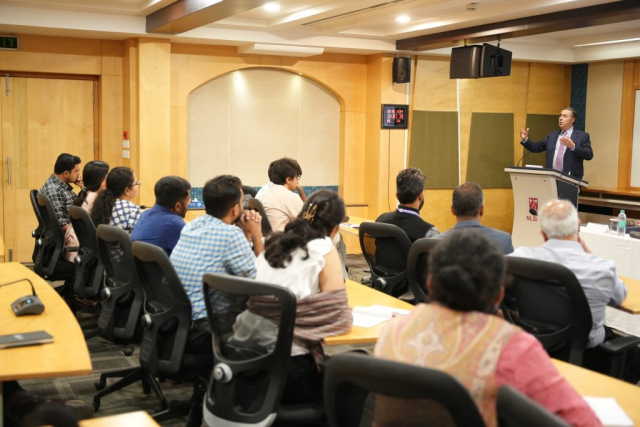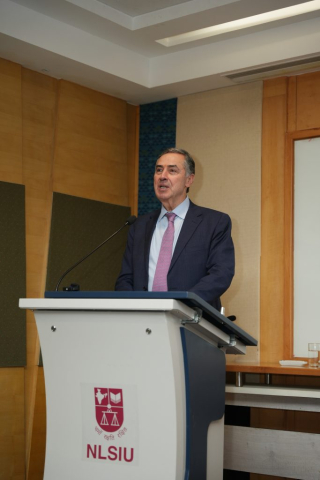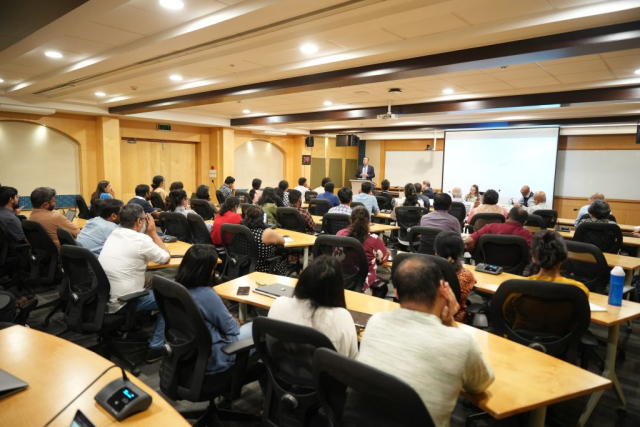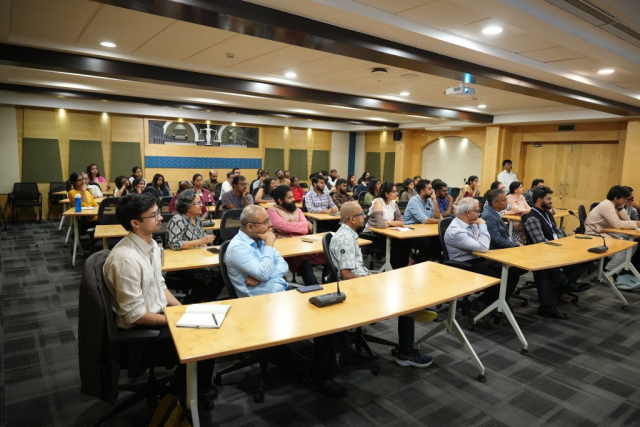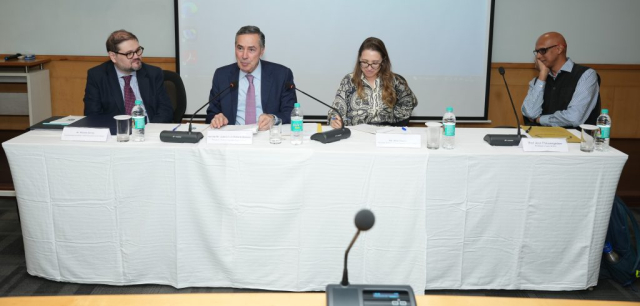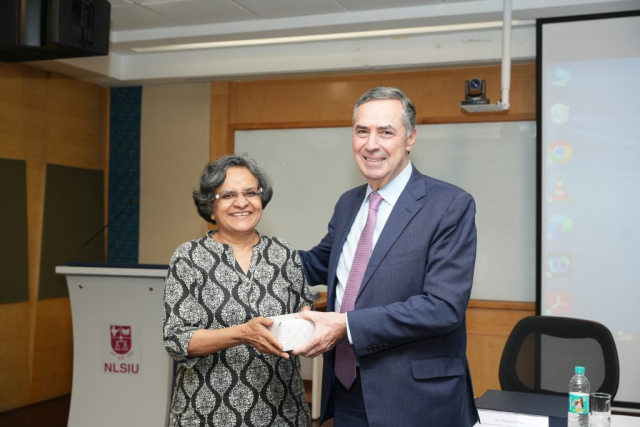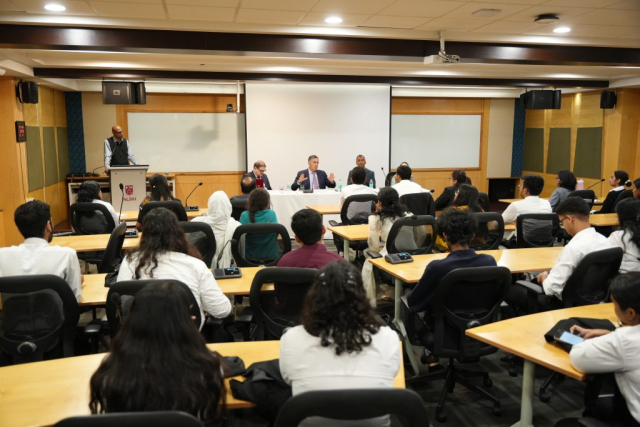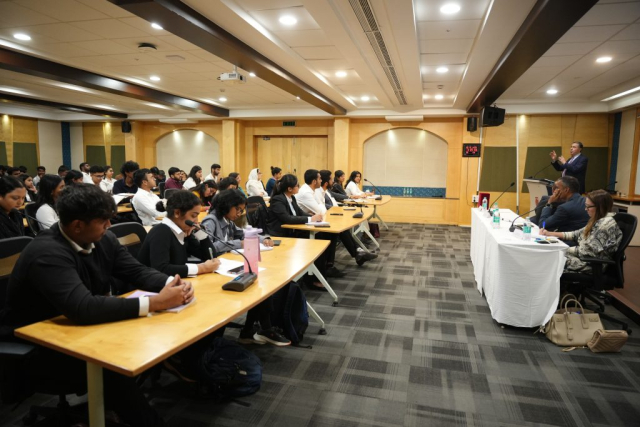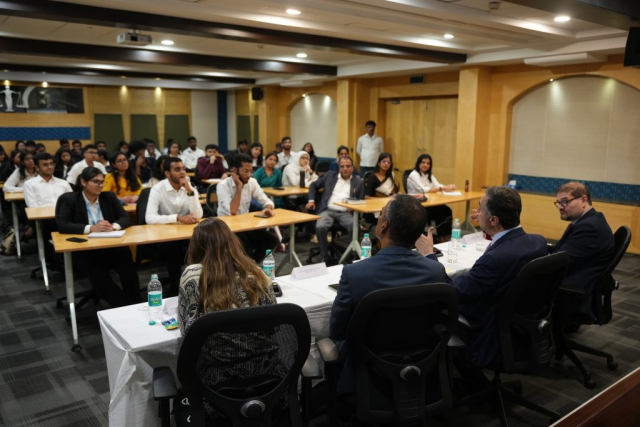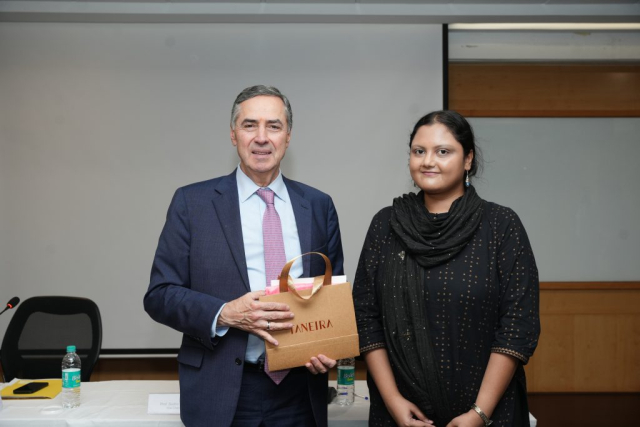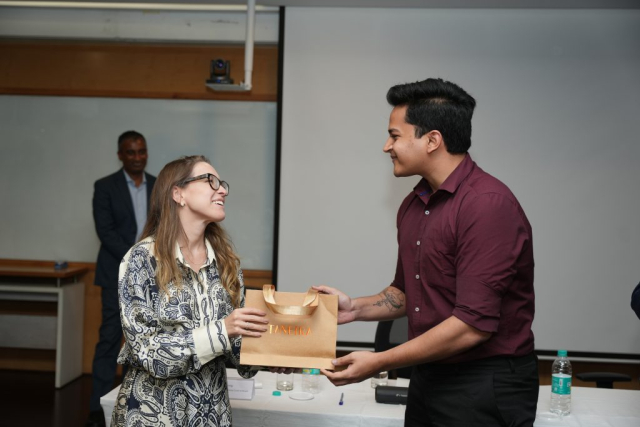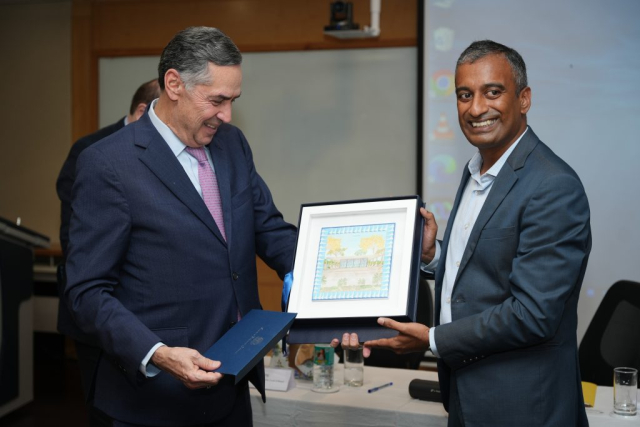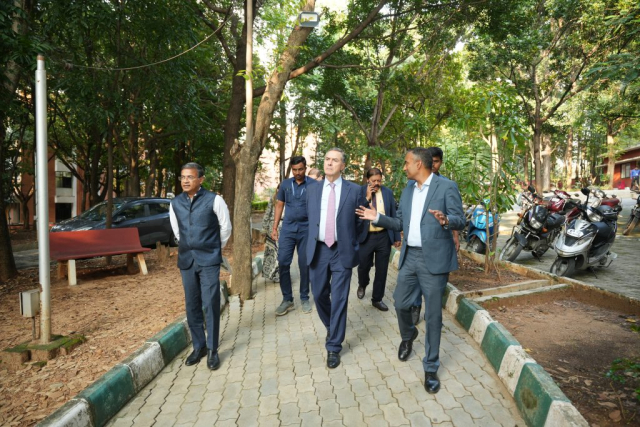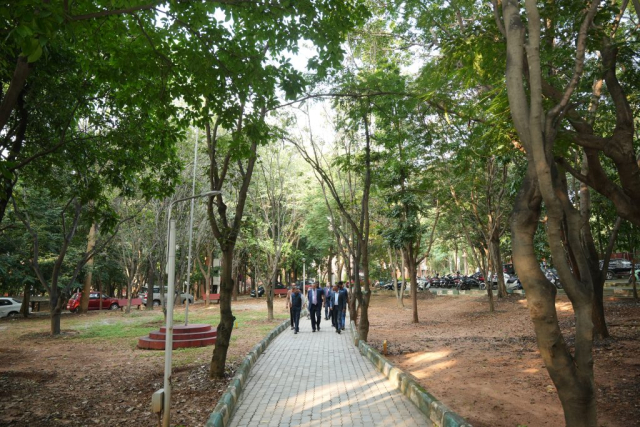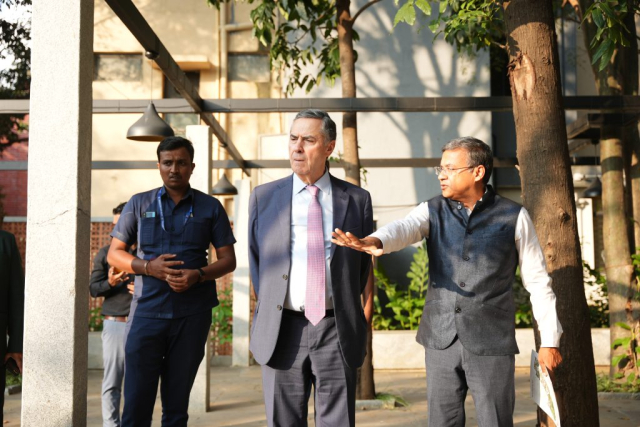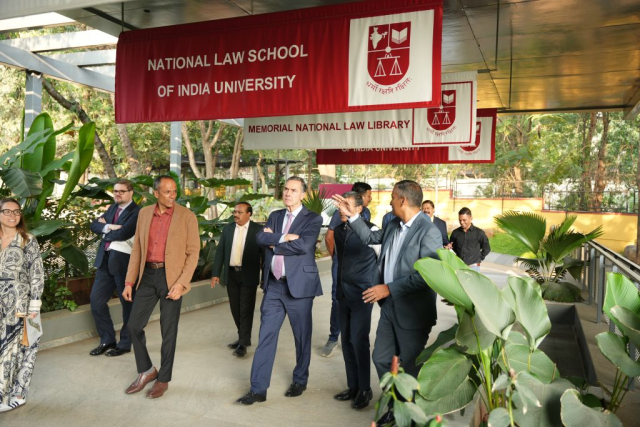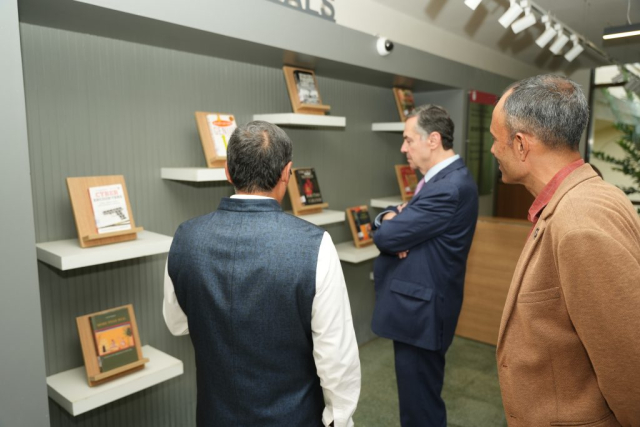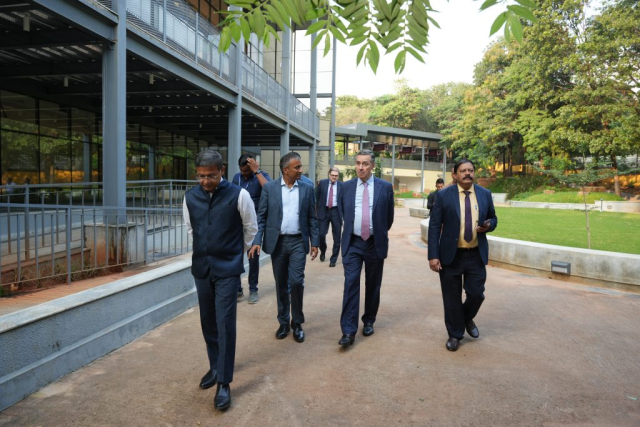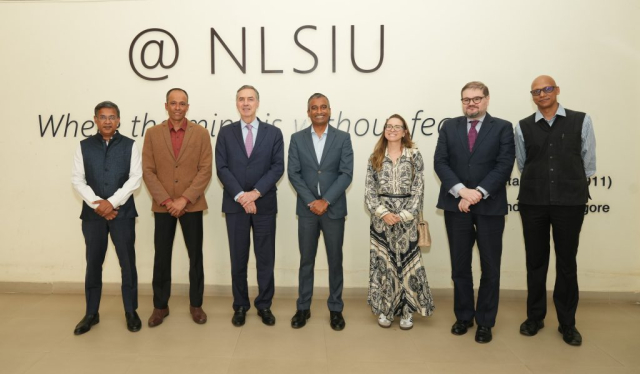Brazilian Delegation Visits NLSIU Campus | Hon’ble Justice Luis Roberto Barroso, President of the Federal Supreme Court of Brazil Delivers Talk to Law Students
October 30, 2024
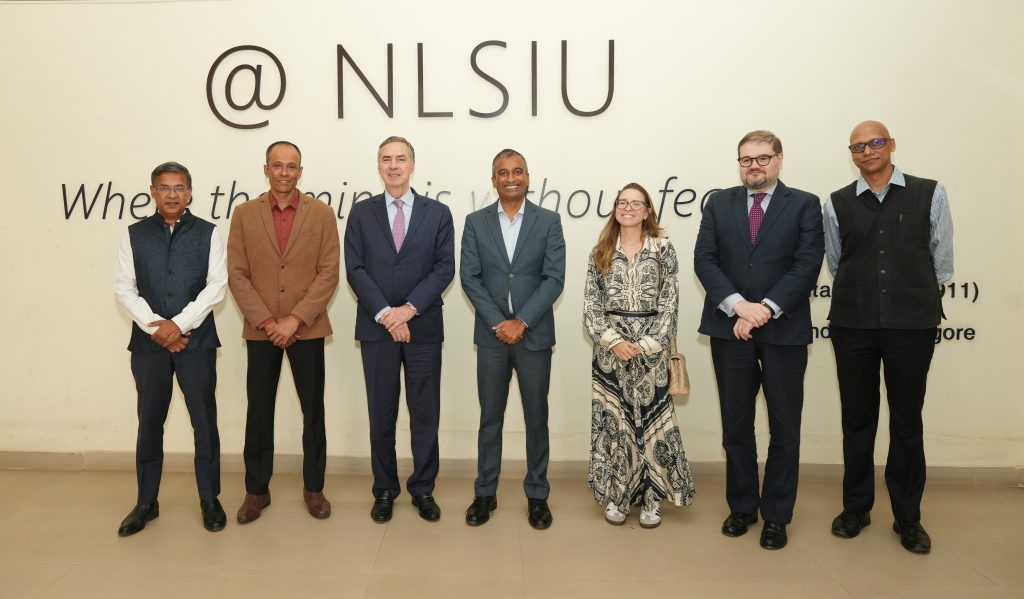
On October 29, 2024, NLSIU hosted a delegation from Brazil including Hon’ble Justice Luis Roberto Barroso, President of the Federal Supreme Court of Brazil, Ms Aline Osorio, Secretary General, Federal Supreme Court of Brazil, and Mr. Roberto Doring, Chief International Advisor to Hon’ble President of the Federal Supreme Court of Brazil.
Justice Luís Roberto Barroso was appointed to the Federal Supreme Court of Brazil in 2013, where he’s been a judge for 11 years. He graduated in Law from the State University of Rio de Janeiro in 1980 and received his LL.M. from Yale Law School in 1989. He also holds a JSD degree from the State University of Rio de Janeiro (2008) and attended Harvard Law School’s Visiting Scholar program in 2011. He was a Foreign Associate with the American law firm Arnold & Porter. Justice Barroso practiced as a private attorney in Brazil before being appointed to the Brazilian Federal Supreme Court. He has also been a visiting scholar at Harvard Law School, and has taught as a visiting lecturer at universities in France and Poland.
Justice Barroso is primarily a constitutional lawyer and a lot of his work relates to Brazilian constitutional law. He is the author of over a dozen books and over 50 published articles (his work is available in English as well). He’s also written about climate change, technological, challenges, and more recently, on regulating artificial intelligence and the challenges it poses.
Their visit to the university campus began with an interaction with the NLSIU Vice-Chancellor Prof. (Dr.) Sudhir Krishnaswamy, followed by a session with faculty and researchers at NLSIU. Later in the day, Justice Barroso gave a talk to students from four different institutions in Bengaluru including NLSIU, St. Joseph’s College, MS Ramiah College, and the University Law College. Their visit ended with a tour of the NLSIU campus during which they were briefed about the latest developments and upcoming projects on campus.
Excerpts from the Talk
During his talk to the students, Justice Barroso focused on three parts: the first part on “Democracies, Supreme Courts, and Democratic Recession in the World”; the second part on “Mission and Role of Supreme Courts”; and the third part on the distinct role that the Brazilian Supreme Court plays in the world, which he opined was similar, in some extent, to the role that the Indian Supreme Court plays.
This is our first chapter, “constitutional democracy and democratic recession”. Constitutional democracy was the winning ideology of the 20th century, having defeated, having prevailed over all the alternatives that presented themselves: Communism, Fascism, Nazism, military regimes, and religious fundamentalisms. The idea of constitutional democracy is like a coin with two sides. On one side, it means popular sovereignty. It means free and fair elections and it means rule of the majority. That’s the democratic side of it. And then there’s the constitutional side of it. That means limited power, rule of the law, and protection of fundamental rights. So this is the idea of democracy we are working with. It’s kind of an ambivalent concept, rule of the majority with respect for fundamental rights and for the rule of the law. Most democracies in the world, including India and including Brazil, have in their institutional arrangement a Supreme Court whose role, among others, is to arbitrate tensions that sometimes exist between the two sides of the coin, between the rule of the majority on one hand and the protection of fundamental rights on the other hand, including the fundamental rights of the minorities. So these are the basic concepts we are going to be working with.
I just said that constitutional democracy was the winning ideology of the 20th century. However, something seems to not be going so well in many countries these days in a scenario that is referred to by many authors as: democratic recession, democratic backsliding, abusive constitutionalism, competitive authoritarianism, illiberal democracy, autocratic legalism, among other derogatory terms that were coined to identify political processes that occurred in different parts of the world, including countries like Hungary, Russia, Poland in a certain moment, Turkey, the Philippines, in Latin America, Venezuela, and Nicaragua; processes that involved the rise of an authoritarian perspective of life. So the question here is, what’s going on in the world that has brought this democratic recession? What we have been seeing is the rise of what has been called the populist wave that has been threatening democracy in different parts of the world. Populism can be right wing populism or far right populism.
In present times, far right populism has been posing more risks to democracy. The basic features, I would say, of extremist populism is first, the division of society between ‘us’ and ‘them’. Usually “we” are, as they say, the conservative, decent people, and “them” are the cosmopolitan, progressive, and corrupted elites. That’s the basic division, and it’s kind of an anti-institutional view of life, of the world, by saying that the elites have dominated the institutions, and by saying that only we represent the people. Well, there are two mistakes there. I’ll focus on one of them.
There are 80 people in this room. There are 80 different views of the world. No one has the monopoly of representing the people. “People” is essentially a diverse notion, and the institutions are the best way to rule a country under the constitution. Every country needs elites, not corrupt elites, not elites that appropriate the state for them, that Acemoglu and Robinson called “extractive elites”. But every country needs intellectual elites, needs elites in the civil service, needs elites in the business community. So populism has these two basic mistakes of being anti-institutional and being anti-pluralistic. And they usually deploy, wherever it grows, some strategies that involve establishing a direct communication with their supporters bypassing the intermediate institutions like congress, like the press, like the universities. And populists usually hate the press, hate universities, and hate the courts because those are institutions that do not bow for majorities. The university is a place of freedom of expression, freedom of thinking, of questioning, and of self correcting whatever is going wrong within the universities and within the world. The press is there to criticize, and courts are there to limit the power of any government.
So since populist governments overemphasize the role of the majorities, they usually don’t like these institutions that are there to criticize and to limit power. The strategy the populist governments usually adopt is choosing courts as their enemies because they would say courts do represent the elites. So populist governments are hostile to courts and they usually try to capture the courts by backing the courts with judges that are friends and curbing the powers of the courts. In some countries, they can put the courts at the service of the government as has happened in Hungary and in Venezuela and in other parts of the world.
So what is constitutional democracy? We’re going through a democratic recession in different parts of the world. Even more traditional democracies like the UK or the United States suffered with populist movements and some leaders that would try to discredit democratic institutions. But as I was saying, we talked a little about constitutional democracy, about democratic recession, and about the rise of the populist wave in the world.
In the second part, I would like to talk a little bit about the mission of the supreme courts and the roles of the supreme courts. The supreme courts have three basic missions. The first one is to ensure the rule of the majority. And by that, I mean courts should not interfere with the legitimate political choices made by governments that were elected by the people. The second mission of a Supreme Court is to preserve the rule of the law, to preserve democracy, including preserve democracy against the abuse of power by the majorities that in many parts of the world try to change the rules so that they can perpetuate themselves in power. The third mission of a Supreme Court is to protect fundamental rights, including fundamental rights of minorities.
In a democracy, there is rule of the majority. The majority can do a lot of things, but it can’t do all. It needs to respect the rules of the game and the fundamental rights of the minority. That’s a basic concept that quite often populist governments try to ignore because they overemphasize the role of the majorities, and they will say ‘we are the majority, and we can do it.’ The courts need to say ‘you are the majority, but I can stop you from doing it on behalf of the constitution.’ So these visions are very important.
Supreme courts in countries like India, like Brazil, like the United States, like Spain, like Portugal, they can do one thing. They can void, they can strike down legislation from the legislature or acts from the executive. So there is a question, there is a discussion on the legitimacy of the courts for doing that since the legislature is elected, and the executive branch is elected, and judges are not elected. I didn’t get one single vote to be where I am, but still I have the power to void a statute passed by congress or an administrative act by the president by the executive branch.
What constitutional theory says about this is that courts, supreme courts are legitimized by the constitution because the people, when they wrote the constitution, reserved a part of political power to a branch of government that’s not majoritarian. It’s there to make sure that reason prevails over the will of the majority. The public reason that is enshrined in the constitution, and that’s our role, and that’s where our legitimacy stems from. This role, this possibility, is referred in constitutional theory as the countermajoritarian role, after a famous quote by Alexander Bickel, an American writer that referred to the counter-majoritarian difficulty. What does that mean? It means that a body that’s not elected can void acts from the elected bodies. That’s why they call it counter-majoritarian, assuming that the legislature and the executive represent the majority. And this is an accepted doctrine, the doctrine of this counter majoritarian rule of supreme courts.
I’d like to add to this two other roles: first, a representative role. Sometimes, especially in countries that have more extensive constitutions like India and like Brazil, and like Spain, many times, the legislature, the legislative procedure, the minorities can block the functioning of the legislature in approving legislation to implement the constitution. So when you can detect that the legislature is not enforcing the constitution in some areas that it should, in these cases, the court can act. And when the court does that, it is actually representing the will of the majority against the elected branches that are not doing it properly.
I’m going to use American examples here because they’re a bit more well known than from other countries. One typical case of a court acting in a representative fashion was a case decided by the US Supreme Court in 1965 called Griswold versus Connecticut. That was a case in which the Supreme Court struck down a statute from Connecticut that prohibited and criminalized the use of contraceptives in a moment in the history of the United States in which, after the women’s liberation movement and the change of costumes, that was simply unacceptable that the use of contraceptives would be criminalized. So there was a statute, there was a law that criminalized it, but it did not correspond to the majority of the feeling and the sentiment in the society. So the court struck that down, on the grounds that it did not correspond to the state of the art of the public opinion, and of the people’s feeling at the time. So a more conservative legislature did not correspond to what they interpreted as being the idea of privacy that was enshrined in the constitution.
Another example many years later, in 2000, was a case called Lawrence versus Texas decided in 2003, when the court struck down a statute that criminalised same sex relations. In 2003, criminalizing homosexuality was totally unacceptable and it did not correspond to the perception of the majority of society. So a minority in congress would not pass legislation legitimizing these kind of relations. So the court had to do it. So in certain instances, the court acts as a representative of the majority when the supposed representative of the majorities, which are legislature and the executive, do not correspond to the actual feeling of the majority.
And there is a another role, much more complex and much less common, and maybe not so acceptable, but it exists: the enlightening role that a court must play very rarely, but in very important moments of the life of a country. I will give you a US example, then I will give you a Brazilian example. And in the US, in 1954, in deciding a case called Brown versus Board of Education, the Supreme Court decided that segregation between black and white children in public schools was unacceptable, was in violation of the constitution, of the idea of equality under the law, under the constitution. That was not a majoritarian feeling in American society and much less in Congress. But still we all agree, I hope, that this was a legitimate decision. So in certain cases, the court might have the role of pushing history in the right direction, overcoming prejudices and discriminations that are supported by the majority.
Another example in Brazil was in the case of same sex relationships, same sex unions. Homosexuality is a fact in life. You cannot deny it and pretend it doesn’t exist. And people enter relations; we prefer to call them homoaffective because it’s not just a sexual relationship. It’s an affective relationship. But homoaffective relations are a fact of life. So law has to deal with it. You need to know in case of death, if there are succession rights. You need to know if there’s a right to alimony. You need to know if you, if someone can be a dependent on the Social Security Program. There are issues that appear involving these kinds of relations. But in Brazil, Congress would not pass a law dealing with a situation of people in homoaffective relations. So the court decided that homoaffective relations should be ruled by the same rules that apply to civil unions or to common law marriages where a man and a woman are living together in a consensual relationship. So the court decided that homoaffective relations should have the same rules governing it as traditional civil unions. And more than that, you could convert that into marriage. So in Brazil right now, due to a court decision, you can have same sex marriages. In Brazil, according to the culture that prevailed, the progressive view of life, of human dignity, of tolerance, of respect for everyone, this prevailed. It did not have a majority in congress, it did not have a majority in society, but I think it was an enlightening decision.
The same has happened with abortion in other parts of the world. In other countries, they decided that criminalizing it was unacceptable. In countries where abortion is kind of a taboo, the court still understood that this is a fundamental right of a woman. The State doesn’t have the right to force a woman to have a child she doesn’t want. Again, this was an enlightening decision. So same sex, relationships, abortion, and fighting racism were enlightening decisions that did not correspond to the sense of the majority in society or in congress, but still, I think in these three examples, that was the right thing to do. So this third role of a court is a very exceptional role. But in certain cases, it’s indispensable to make history go one step forward when it’s stuck for some reason for prejudice or discrimination.
Finally, I’m gonna say a word about the supreme court of Brazil that, as far as I know, has some similarities with your experience here in India. First of all, there’s a distinction that we need to make between judicialization and judicial activism. Judicialization is the possibility of taking an issue, a matter, to a court of justice to be decided. In Brazil, we have broad judicialization. Actually, we have a world record. We have 83 million and eight hundred thousand lawsuits pending. And 35 million lawsuits are filed per year, and 35 million lawsuits are decided per year. So these are numbers that are very impressive. So judicialization in a country like Brazil, probably in a country like India, is a fact, and it occurs a lot.
Judicial activism is different. It’s not a fact. It’s an attitude. It’s a mindset. It’s the use of a broad, vague principle to create law for situations for which there’s no law, there’s no statute. So judicial activism is the judicial creation of law when there isn’t one, and sometimes it’s quite legitimate, sometimes it might be overstepped in the rule of the court. So there is a difference between the fact of judicialization and the mindset of expanding the reach of a constitutional principle.
The Brazilian Supreme Court plays a very unique role, and it’s a very powerful court, for good and for bad.
It’s very powerful first because the Brazilian constitution, as the Indian constitution, is extremely comprehensive and detailed. The Brazilian constitution, the Indian constitution, as any democratic constitution, deals with separation of powers, with bill of rights, and with the organization of the state. But the Brazilian constitution also deals with the social security system, with the vocational system, with the public health system, with the budgetary system, with the protection of the environment, with the protection of the indigenous communities, with the protection of the family, with the protection of the elderly, with the role of the state in the economy, and you name it. So many matters that in other parts of the world are left to politics or to ordinary legislation, but in the case of Brazil, they are in the constitution. When you bring a matter to the constitution, to a certain extent, you removed it from politics and brought it into law because you can file claims based on those norms that mention those possibilities and those rates.
Second, in Brazil, besides cases reaching the Supreme Court through appeals, like the writ of certiorari in the United States, you can file direct actions before the Supreme Court challenging a statute on its face or a public policy on its face. So you can reach the court easily through direct actions.
And then there’s a third reason. These direct actions can be filed by a vast array of private and public actors. Direct actions can be filed by the president of the republic, the attorney general, the Congress, all State legislators, all governors, all political parties with representation in congress, the National Bar Association, the National Confederation of Workers, etc. So there are over a 100 entities that have standing to file direct actions. That means that just about anything in Brazil can reach the supreme court. We decide just about everything you can think of, and I’ll give you examples later.
Fourth, the Brazilian supreme court has a huge criminal jurisdiction, both original to judge authorities and all members of parliament; and it also has jurisdiction to take cases in appeal through habeas corpus. So criminal jurisdiction always attracts media coverage and interest by the public.
And fifth, and quite different from what you see anywhere else, the judgments by the courts are broadcast on free-to-air television. I’m not talking about the hearings. I’m talking about the deliberations. So we deliberate in public (it has always been in public), but in the past 20 years, it’s being broadcast on television. So the Brazilian Supreme Court has a kind of prominence that no other court in the world has because we decide just about everything you can imagine, and it’s broadcast so everybody can watch. So, supreme court justices in Brazil were public figures, for good and for bad. Until recently, it was basically for good.
So in this scenario I just mentioned, I can just describe a few of the cases that we have decided in recent years – same sex unions, embryonic stem cell research, affirmative action for people of African descent, demarcation of indigenous lands, environmental protection, termination of pregnancy, attacks on democracy, regulation of social media, health measures during the pandemic, rights of transgender people. All these issues are divisive in any society. So we decide the most divisive issues of the Brazilian society in a country and in a world that is very polarized with progressives, liberal, and conservatives. So, we are popular among part of the population. And we are unpopular among another part of the population. And Brazil suffered a major problem with the rise of extreme populism and even the risk of a coup d’etat and we suffered attacks on 3 institutions after the elections. Thousands of people invaded the Supreme Court, the National Congress, and the Presidential Palace. It was a really horrible moment for democracy.
So, I’m going to finish this part of the presentation by saying, what’s constitutional democracy? The constitutional democracy, usually they have in their arrangement, a supreme court. There has been a democratic recession in the world. Supreme Courts must resist the rise of populism when it becomes authoritarian at least. In some countries, the courts were able to avoid the worst. In other countries, the courts were captured or just collapsed. And supreme courts have these three main roles I mentioned – to ensure the rule of the majority, to preserve the rule of the law, and to protect fundamental rights of everyone including the minorities. And in the case of Brazil, the Supreme Court has this leading role because of a very comprehensive constitution that makes it more difficult to draw the line, the border between law and politics because, many issues as I said, that normally are left to politics, become constitutional issues in a matter of constitutional interpretation in Brazil.
And here, there is a delicate point that I want to end with. The supreme courts must, under the constitution, protect constitutional values, protect human dignity, protect fundamental rights, protect the rule of law, but you cannot become a political actor. Because if you become a political actor like the other branches of government, you just lose your legitimacy. So drawing this proper line is very difficult, but it’s also very, very important.


